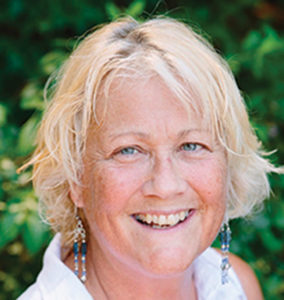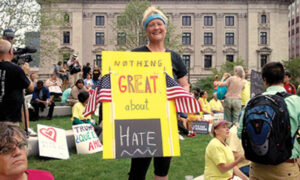By Jane Keller Gordon, Assistant Editor

Growing up near farmland northeast of Philadelphia, Jeanette Millard spent time as a member of a Quaker Meeting and with her activist parents, who were protesting the Vietnam War and marching for civil rights. Throughout her life she has followed their lead – studying abroad in Germany before it was common; marching with a group of 300 people from Selma to Montgomery on the 50th anniversary of the Voting Rights Act; and, most recently, travelling – alone – to the Mexican border in 2018 to protest when children were being separated from their parents.
Prior to the pandemic, Millard was working as an organizational consultant and leadership coach.
“I was really in trouble,” she recalled. “One day in early March within 24 hours I lost all my clients except for one. A friend of mine sent me a blurb about contract tracing. They were looking for people with health backgrounds and also for people who were good at talking to a range of people.”
Now working as a contract tracer for Massachusetts COVID-19 Community Tracing Collaborative (CTC), Millard feels that she has found a new calling.

Millard knew that she was good at talking to people and that her life experience would make her a good fit. She is multilingual, had taught German at the Winsor School in Boston, and had worked in the public, private and nonprofit sectors, helping people design, manage and effect change, especially in cross-cultural situations.
She also knew what it meant to experience illness and survive. Recovering from breast cancer in her early 40s, when her son and daughter were young, Millard joined WeCanRow, a wellness and recovery program for women who have been treated for breast cancer.
Millard also was familiar with Partners in Health, which had been contracted by the state to run the contact tracing program.
“I am a big fan of Paul Farmer, one of the founders of Partners in Health. That organization has a long track record of developing public health approaches to dealing with infectious diseases throughout the developing world. They see health care as a human right,” she said.
Now on the job 40 hours a week, Millard described a three-pronged approach for her average caseload of 25.
“We accompany the person through a very scary and isolating time. During the first call, we ask about symptoms, and collect health, epidemiologic and demographic data that is processed then goes to the state’s public health department’s database,” she explained. “We do a home assessment to determine what is needed to support the individual’s quarantine. Local communities are notified when individuals need help. Some towns have chosen to do contact tracing themselves.”
The last step is that contract tracers call every day for 10 days.
“This continuity of the same person calling makes a big difference,” Millard noted.
“Our goal is to find out who has been exposed and to prevent further spread. We look back and we look forward,” she said. “In many cases, people seem embarrassed that they have infected others. But it’s a tricky virus and that’s tough to avoid. Most of the time people have some sense of how they got exposed.”
Millard hopes to go back to her work as an organization development consultant but for now, she said: “It’s a great feeling to be able to do something concrete to actually fight COVID-19.”
Photos/submitted












